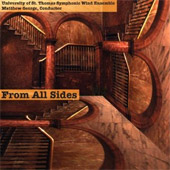CD review - From all Sides

Matthew George has commissioned over sixty new band works, and this CD highlights a number of the more recent. The final work was commissioned in 2009, and gives the CD its title. Ambush: From all Sides is by Chen Qian, a Beijing composer whose work I have admired for a long time. Ambush is based on an historical story picturing the battlefield of ancient war in China. The decisive battle of Gaixia was a well-known battle in Chinese history. The cliché here is of course the pentatonic scale which is basic to so much oriental music, but Chen uses it with great energy and skill in a series of tableaux of which he writes
The composer wanted to elaborate on the picture as shown through this composition played by wind band. Music constructed con-tinuously like the Chinese painting (painting is done by using a brush on paper or silk, often with black ink alone. It is a monochro-matic work of art, perhaps, derived from cal-ligraphy. A Chinese painting is a distinctive object based on centuries-old traditions com-mon to many things in China.) with following story-line:
- 1. Worship of primitive simplicity
- 2. World of fancy and wonder
- 3. The reflection from one's inner reality
- 4. Harmony with nature
- 5. Knowledge of no-knowledge
This music was composed like the painting style and technique: priority of colors (differ-ent level of gray from dark to paper white), blank space (silence),
This is a picturesque and very attractive tone-poem from its blockbusting start and ending, to the eerie sounds of the central slow sections, a wonderful addition to the growing repertoire of oriental wind band music; it receives a skilled and energetic performance by Matthew George and his fine ensemble, and we are hugely indebted to him for some outstanding new works, of which this is an excellent example.
Whirr, Whirr, Whirr!!!
I was reminded last year of the story of Sir Thomas Beecham, who was interrupted by a composer during a rehearsal in the Royal Albert Hall of a complex contemporary piece. "My dear chap, we are not playing your work yet". I was lecturing on repertoire in Brisbane, and I played part of Whirr, Whirr, Whirr!!!, a really good fun opener of just over 3 minutes - the composer Ralph Hultgren thought he recognised it and eventually did.
Here it is again, opening a CD recorded for Innova label by Matthew George and his University of St. Thomas Wind Ensemble. It is a super little piece, full of energy, a good tryout for fingers and tongues and at 3 minutes 10 seconds maybe a tad on the short side.
I was interested to hear Lost Forest by the Argentine composer Luis Nani, because it forms the climax of the International Youth Wind Orchestra concert in WASBE in Taiwan. It is not for me; I found the ideas quite old-fashioned and trite, the melodic and harmonic movement repetitive and the whole piece rather disappointing.
Lost Forest served to throw Kit Turnbull's Scenes from Childhood into sharp relief; wittily scored, here are some charming movements. This is a fun piece and like the Hultgren is a welcome addition to the repertoire for groups who are seeking out approachable music with a few neat twists.
Whenever I complain about the preponderance of clichés in band music, my old friend Guy Woolfenden challenges me to do better, knowing from our Cambridge days that I can hardly write a perfect cadence. Martin Ellerby and I nearly came to blows when I failed to give a convincing raison d'être of my arguments as to why a melodic or harmonic clirché I can accept in Puccini or Rachmaninov I find slightly offensive in - well, any modern composer, a situation only saved by lunch and a bottle of wine. Philip Sparke captured the problem in his programme note on A Weekend in New York, a piece I thoroughly enjoy; he writes:
I felt fully justified that, when creating a musical impression of my brief visit, I could indulge in what are perhaps musical "New York" clichés, as this was one time when the cliché and reality were satisfyingly the same.
I guess it is not so much the cliché that matters, but what the composer does with it, and A Weekend in New York exploits the New York sound with all the skill and energy that we traditionally associate with Philip Sparke.